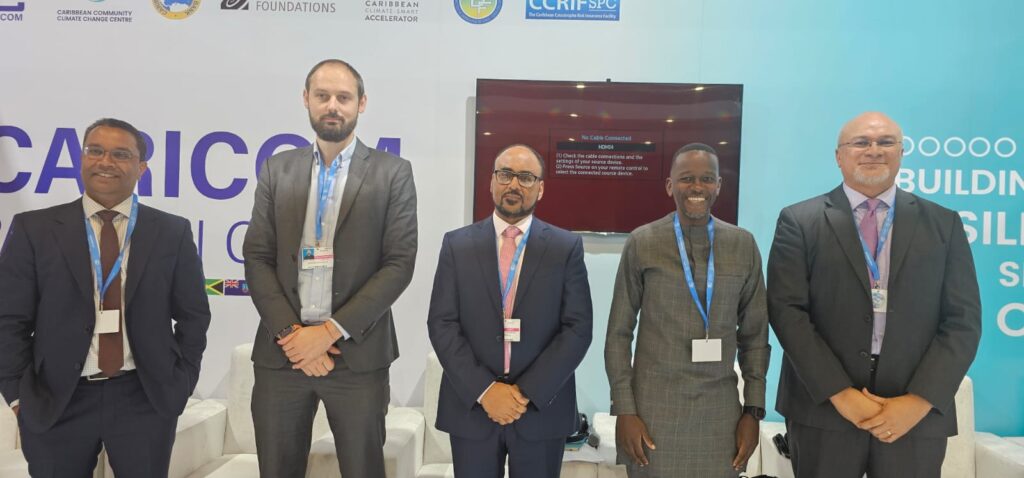
JOHANNESBURG, 13 November 2024 – Hybrid mutual insurer African Risk Capacity Limited (ARC Ltd.) is taking a leading role at COP29, advocating for innovative disaster risk insurance solutions to build climate resilience in Africa. This year’s “Finance COP,” taking place in Baku, Azerbaijan, from 11-22 November, is focused on improving and increasing the delivery of climate finance to developing countries, with negotiations centred around adopting a new climate finance target.
ARC Ltd. will drive critical conversations by hosting panels at the CARICOM and Climate, Peace & Transboundary Resilience pavilions. These panels will showcase advancements in disaster risk financing and highlight how these solutions can support long-term climate adaptation strategies.
ARC Ltd. also joins fellow Regional Risk Pools – the Caribbean Catastrophe Risk Insurance Facility Segregated Portfolio Company (CCRIF SPC), Pacific Catastrophe Risk Insurance Company (PCRIC), and Southeast Asia Disaster Risk Insurance Facility (SEADRIF) – to engage with global stakeholders during these two weeks and further address the impact of climate change on vulnerable communities.
Strengthening financial and operational preparedness
Southern Africa is highly susceptible to a range of shocks, including climate-related disasters like floods and droughts, as well as pandemics, conflict, and social unrest, which increase fragility in the region. The World Bank Group Strategy for Fragility, Conflict and Violence (FCV) 2020–2025 recognises climate change as a significant driver of FCV and as a threat multiplier.
This vulnerability is often compounded by a lack of financial preparedness. As a result, countries over-rely on reactive financing instruments and ad-hoc budget reallocations for disaster relief. This diverts crucial resources from health, education, and social protection, undermining broader development gains.
The Regional Emergency Preparedness and Inclusive Recovery (REPAIR) Programme, a collaborative initiative launched in July 2024 by the World Bank, ARC Ltd., the Global Shield, and their partners, aims to address this challenge by strengthening participating countries’ financial and operational preparedness for such shocks.
On 14 November, from 12:30 to 13:30, Senior Programme Manager Avinash Ramessur will lead ARC Ltd.’s panel discussion on “Strengthening Financial and Operational Preparedness Through Innovative Disaster Risk Financing Solutions”. The panel will explore the instruments and products developed to assist climate-vulnerable countries. The panellists are:
● A World Bank representative
● ARC Ltd. CEO Lesley Ndlovu
● UK Foreign, Commonwealth and Development Office Director General of Economics, Climate and Global Issues, Jenny Bates
● Howden Group CEO of Climate Risk & Resilience Rowan Douglas
● Mozambique’s Ministry of Economy and Finance Director: Climate Finance Unit, and government representative under the ARC Drought Insurance Policy and REPAIR Programme, Albano Manjate
Innovative insurance solutions for the most vulnerable in Africa
Escalating extreme weather events disrupt agricultural productivity, leading to failed crops and damaged harvests, increasing food insecurity and water scarcity. Additionally, a humanitarian crisis is unfolding with disasters forcing people to flee their homes to live in overcrowded refugee camps or urban slums with little access to basic public services. These vulnerable and marginalised communities are particularly susceptible to ongoing climate calamities.
On 18 November, from 11:45 to 12:45, Underwriting Manager and Humanitarian Lead Gloria Womitso will moderate another ARC Ltd. session, exploring initiatives like the Replica Programme, which supports governments by enabling humanitarian organisations to replicate government disaster risk insurance policies, providing coverage for vulnerable communities. ARC Ltd. recently extended the programme to the UN Refugee Agency, and for the first time, refugees and displaced persons are also protected.
Womitso will be joined by:
● United Nations Children’s Fund Chief of Innovative and Alternative Finance for Children, Solomon Thomas will present on their initiatives to support children and the youth.
● The Netherlands Ministry of Foreign Affairs Director of Inclusive Green Growth, Ambassador for Sustainable Development and Arctic Ambassador, Wampie Libon will discuss efforts to integrate sustainability into African development, while addressing climate change and resilience for the most vulnerable populations.
● USAID Bureau for Resilience, Environment, and Food Security Deputy Assistant Administrator Ann Vaughan will share insights on integrating food and nutrition security into resilience building, with a focus on marginalised communities.
● Food and Agriculture Organization Operations Officer Sylvie Wabbes will present on FAO initiatives for securing food through anticipatory action and financial resilience.
● ARC Ltd. CEO Lesley Ndlovu will share information about innovative insurance products developed by company and its partners to assist governments in times of crisis.
Regional Risk Pools and loss and damage
Risk pooling mechanisms offer a lifeline for at-risk countries, especially small island and coastal states, disproportionately impacted by loss and damage caused by climate change. These mechanisms allow governments to transfer risk and access rapid liquidity when disasters strike.
While the Loss and Damage Fund aims to provide financial relief post-disaster, risk pools are based on a pre-arranged financing structure that enables rapid payouts to governments based on predetermined triggers, such as rainfall levels or drought conditions. This approach facilitates early intervention before communities are forced to resort to negative coping strategies, complementing the broader objectives of the Loss and Damage Fund.




